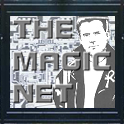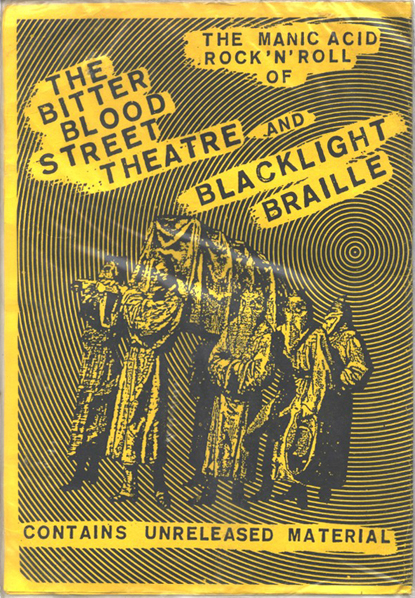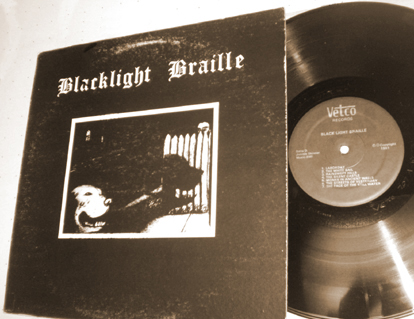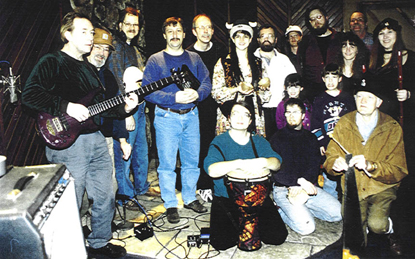|
There was a two volume anthology of Bitter Blood Street Theatre released on vinyl by Vetco Records in 1978, both albums of which change hands for quite a price now. Above is the cover of a 1987 release by Swiss tape label, Calypso Now, serving as a bridge between the projects. MM: I gather you were never fully content as simply a member of Bitter Blood, so come the 80’s, having lost quite a few band members to out of state moves, you took the opportunity to revamp the remaining line up and co-founded Blacklight Braille with Doug Smith, a fringe musician who had collaborated with such avant garde luminaries as Laurie Anderson. Presumably, this was as a more artistic outlet for yourself, whilst still channelling the creative output of many other musicians. What are the origins of the name, Blacklight Braille, what was your vision for this new co-operative and why was there not the same strong live element to the project as there had been with Bitter Blood? OK: Blacklight Braille would be a thing most difficult to find – ultraviolet dots. So our band, if we were to play far out music, there would be few who would be interested, so few would be told when or where we were playing. – I wanted to create things with sound and was impressed with the music of Doug Smith. – I believe we would have had a number of good live shows if Art Montgomery had not been killed. Then we brought in some new musicians, and we were not always, with our music, always on the same page. MM: Blacklight Braille’s first album appeared on Vetco in 1981 (just as Laurie Anderson was hitting no.2 in the UK charts with “O Superman”), “Electric Canticles Of The Blacklight Braille”, the whole of the first side of which is up on You Tube, brilliant stuff, fusing electronic, spacerock elements and “nutty narrative spieling”, as one fan and blogger joyously described it. I’ve barely heard two Braille albums that sound the same, there are clearly too many permutations of the various influences and characters that create the sound. When pushed to pigeonhole your music, which, let’s be honest, none of us really like doing, you tend to answer with the phrase “fringe rock”. Did you ever plan to follow one style of music only to be cast adrift, is there any set plan as each new album is approached, and how would you describe the concept of “fringe rock” to the uninitiated? |
OK:
The name, Fringe Rock, lets people know it can’t be counted on to fit into
a predicted form. Even we, who were out on the fringe, ended days with a
little less, or a little more than we had in mind, but we had put down our
pennies and were not going to let them go to waste. It might be something
to build on later. So, everything gets released. They were our pennies
and pennies were not that easy to get – in our working years. Now, with
more pennies, I have gone back in the studio and looked again at some of
our old products. "Electric Canticles Of The Blacklight Braille" (Vetco Records, 1981) MM: I’ve not been able to find a complete discography for the Braille, but I believe you were already a couple of dozen albums into your journey by the time you first contacted M&E. We had quite a few of these available via our Distro Direct service, many of which were steady sellers. When it came time to send you our resulting collection of US Dollars, you declined to accept them and insisted that we put the money back into the M&E project instead, which I always thought was impressively kind of you. Thus I find it impossible to believe commercial success would have been any great motive to the creation of Blacklight Braille. What were those motivations, what did you hope to achieve from it all and how close do you feel you got? OK: In our early years we had no money, but even then, we were creating for the joy of it. And we still do. Now I am writing for the joy of writing. My latest is King Arthur, An Astral King, and I want people to enjoy it, and I do not think about sums of money – which books sometimes bring. I have learned I can create things and get them out to other people.
Blacklight Braille - The Cincinnati Massive, with Owen front right MM: It really is quite a stunningly talented selection of musicians and singers that made up Blacklight Braille. I love Emily Baehr’s voice for one, “Persephone Of Short Vine” (from “Into The World Of The Gods” – Vetco 613) is my absolute favourite Braille song. So much so that I now feel quite guilty for once publishing that she was the daughter of 60’s TV star, Yogi. Ahem. Moving on. I’m also a great admirer of the work of Qubais Reed Ghazala, who has also graced M&E with three of his incredible solo experimental albums; “There Is A Secret Garden” (M&E 226), “Suite For Radio And Turntable” (M&E 228) and |
||||||

.gif)
.gif)


